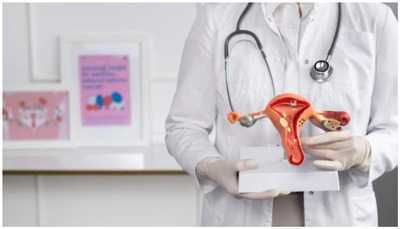

PCOS (Polycystic Ovary Syndrome) is a hormonal disorder. It's a common condition caused by hormonal imbalances in women. It's caused by increased androgens (male hormones), insulin resistance, and genetic factors. This leads to irregular periods, excess facial or body hair, weight gain, acne, and hair loss. A proper diet is crucial for managing PCOS. Learn about the foods to eat and avoid for PCOS.
What to eat with PCOS?Firstly, focus on low-glycemic index (GI) foods. These foods help stabilize blood sugar. Include barley, millet, oats, brown rice, quinoa, green vegetables like spinach and broccoli, and fiber-rich foods. Fiber slows digestion and regulates insulin.
What to eat for fiber?For rich fiber, consume fruits like apples, oranges, and berries. Also, include vegetables like bell peppers, carrots, and cucumbers.
Include protein-rich foodsProtein stabilizes blood sugar and keeps you feeling full for longer. Include lentils, chickpeas, kidney beans, eggs, fish, and grilled/baked chicken in your diet.
Don't forget healthy fatsHealthy fats aid hormone production. Include avocados, nuts, seeds (flaxseed, chia seeds), olive oil, and coconut oil.
Antioxidants and anti-inflammatory foodsReduce inflammation and oxidative stress. Include turmeric, ginger, green tea, and dark chocolate (low sugar) in your diet.
Herbal teas and dairy optionsUse low-fat dairy or alternative milk like almond milk or coconut milk. Green tea and peppermint tea are beneficial for PCOS symptoms.
What not to eat with PCOS?Processed and junk foods: These are high in sugar, salt, and trans fats. Avoid packaged snacks, chips, cakes, and pastries.
Refined carbs: These quickly raise blood sugar. Avoid white bread, refined flour, and pasta.
Sugar and sugary drinks: These contribute to weight gain and worsen insulin sensitivity. Avoid soft drinks, packaged juices, and candy.
Excessive dairy products: Dairy can exacerbate hormonal imbalances. Avoid full-fat milk, cream, and butter.
Saturated and trans fats: These can increase inflammation and hormonal imbalance. Avoid fried foods and packaged bakery products.
Caffeine and alcohol: These can cause hormonal disruptions. Avoid coffee and alcohol.
High-sodium foods: These can increase water retention and bloating. Avoid snacks like papad, pickles, and instant noodles.